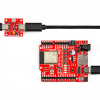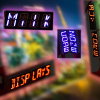Engineering Roundtable - Nick talks about Logic Gates
Check out today's edition of Engineering Roundtable!
In today's episode of "Engineering Roundtable," SparkFun product guru and hacker extraordinaire Nick Poole discusses logic gates and how you can model them using dominoes. Check out the video!
As always, please feel free to leave any questions or suggestions in the comments section below. Hope you all had a great weekend! Cheers
Share
Use this URL to share:
Comments 25 comments
Related Posts
Recent Posts

Switching Power with USB-C
November 22, 2024
0

Get More Than Expected Out Of Your SparkFun Alphanumeric Displays
November 20, 2024
0

Teen Hack Club Launches Coding Challenge Across International Waters
November 19, 2024
0

A Technical Comparison of the RP2350 and RP2040 Chips
November 13, 2024
8

SparkFun Soft Power Switch Simplifies Power Control
November 8, 2024
0
Tags
- 20 Years
- 3D Printing
- Accelerometer
- According to Pete
- Actobotics
- ADR
- Adventures in Science
- AI
- AI/ML
- A La Carte
- Alchitry
- A Look Back
- Analog
- Android
- aquaponics
- Arduino
- ARGOS
- ARM
- Art
- Artemis
- Artificial Intelligence
- Ask Me Anything
- astronomy
- Audio
- AVC
- AWS
- Back to School
- badge
- BadgeLife
- Barcode
- Battery
- Beagle
- Best of...
- Binary
- Binho
- Biometrics
- Black Friday
- Blues Wireless
- Bluetooth
- Blynk
- Body Hacking
- Books
- Bosch
- Brand Ambassador
- Buck
- Business
- Button / Switch
- Caption Contest
- Cellular
- Chibitronics
- Cloud
- CNC
- Coding
- Community Partner
- Components
- computer engineering
- Connector
- Contest
- Crafting
- Crypto
- Culture
- Cyber Monday
- DA16200
- DataLogger
- DEKA
- Desk of an Engineer
- Discussion
- Distance
- DIY
- DIY Bio
- Dogs
- Drones
- Dumpster Dive
- Eagle
- Edison
- Education
- EEPROM
- ElectriCute
- Elektor
- EMG
- Enclosure
- Engineering
- Engineering Essentials
- Engineering Roundtable
- Environment
- ESLOV
- Espressif
- E-Textiles
- Ethernet
- Event
- Events and Classes
- ExpressLink
- fablab
- Firmware Update
- FIRST
- FLIR
- FPGA
- Free Day
- FreeRTOS
- Fritzing
- FTDI
- GDPR
- Gift Guide
- GIS
- GitHub
- GNSS
- GPS
- GreatScott!
- Guest Post
- Hackaday
- Hackathon
- Hacker-in-Residence
- Hacker/Maker Spaces
- Hackster
- Hakko
- HaLow
- Hardware Hump Day
- HAT
- History
- Holiday
- Hookup
- iFixit
- IIoT
- IMU
- inspectAR
- Intel Edison
- Internet of Things
- IoT
- IoTuesday
- ipobesity
- IRC
- Iridium
- IT
- jackie
- KiCad
- Kit
- Laser Cutting
- L-Band
- LCD
- Learn At Home
- LED
- Legal
- LIDAR
- Light
- LilyPad
- Livestream
- LoRa
- LTE
- Lumenati
- Machinechat
- Maker Faire
- Manufacturing
- Mars
- mathematics
- Matter
- May the 4th
- Meet Your Maker
- micro:bit
- MicroMod
- MicroPython
- mikroBUS
- MIKROE
- Milestone
- Modification Station
- Music Technology
- MyoWare
- Nate posts
- National Tour
- New Product
- News
- Newsletter
- NFC
- NPI
- NVIDIA Jetson Nano
- Onion Omega
- Open Hardware
- Open Sauce
- OpenSTEM
- OSHW
- Particle
- PCB Design
- Photon
- PIR
- Please Wear a Mask
- PNT
- positioning
- PostgreSQL
- Power
- Primary
- Privacy
- Product Focus
- Production
- Programming
- Project Highlight
- Projects
- Pro Micro
- proximity
- Psychology
- Python
- Q&A
- QuickLogic
- Qwiic
- radar
- Radio
- Rapid Prototyping
- Raspberry Pi
- Raytac
- redboard
- RED-V
- Renesas
- Resistors
- rfid
- RISC-V
- Robotics
- RTK
- Sale
- Satellite
- Science
- Scratch
- SDR
- Sensirion
- Sensor
- Septentrio
- Services
- Servo
- SIK
- Single Board Computer
- Single Board Computers
- Smart Home
- smol
- software
- Solar
- Soldering
- Space
- SparkFun Ambassador
- SparkFun Edge
- SparkFun Live
- SparkFun Use Case
- SparkPNT
- SparkX
- SPE
- Spectacle
- Sphero
- Start a Project
- STEM
- STM32
- STMicroelectronics
- Success with SparkFun
- Supercon
- surveying
- Sustainability
- Swarm
- Table Top Gaming
- Teardown
- Tech Comparison
- Tech Talk Tuesday
- Teensy
- tensorflow
- Testing... Is this thing on?
- Thing Plus
- Thread
- tinyML
- ToF
- Tools
- Triband
- Tutorial
- u-blox
- Ultrasonic
- USB
- VCSEL
- Video
- wearables
- Weather Shield
- webinar
- Website Feature
- WiFi
- Wireless
- Wires
- women
- Work From Home
- Workshop
- WPI
- XBee
- XRP
- Zigbee

Correct me if I'm wrong, but couldn't you make a bottle-less XOR gate simply using a semi figure-8 pattern? Something like:
I'm not sure I understand the theory of operation here but give it a shot!
There's no question that you can make a bottle-less version, I adapted mine from a bottle-less version. Using a bottle (or rolling pin, or paper towel tube) allows you to conserve dominoes.
Also, all of these gates work better with "toy dominoes," the wooden kind that don't have numbers on them specifically made for knocking down. These plastic things are a little finicky.
Thanks for watching!
Have you tried this? Would it even work?
Nick, you are brilliant. But we absolutely need the outtakes of this video! :)
Fun video! I bet you could make a NOT gate by balancing 1 domino flat across a few dominoes on their side, and let the domino just before it cause it to tip over and get trapped upright between the dominoes it was laying on (which is why you'd want more than 1), and the one that causing it to tip over :)
For those looking to play around with logic gates, the LogicBlocks kit is pretty good introductory fun, too.
The LogicBlocks are a lot of fun! I totally should have talked about them in the video.
I got them as a present and they are really awesome!
Any chance of carrying a 7400 series IC kit with enough gates to learn the basics of digital design, all the while being slightly more advanced than the LogicBlocks kit?
I second this!
Looking at the Full Adder truth table, I thought it was weird, so I jotted it down, confirmed it was weird, then compared to other sourced just to make sure I wasn't crazy. There where three rows in it that where right, a few repeated input rows (with different results?!), and it was incomplete.
For reference, a proper Full Adder table would be: A | B | Cin | S | Cout ----------------------- 0 | 0 | 0 | 0 | 0 0 | 0 | 1 | 1 | 0 0 | 1 | 0 | 1 | 0 0 | 1 | 1 | 0 | 1 1 | 0 | 0 | 1 | 0 1 | 0 | 1 | 0 | 1 1 | 1 | 0 | 0 | 1 1 | 1 | 1 | 1 | 1
Oh, No! I copied it too quickly and so two of the rows have the Carry-ins wrong. Thank for catching that!
Awesome video nick! As a teacher this is exactly what i'm looking for to be able to communicate electronics and logic to students! I was hoping for a room sized domino rally network... but I'll put my students on that one!
Yeah, so was I but I hadn't thought to order enough dominoes (oops)
If you search dominoes on eBay, there's a seller in china that does something like 100 dominoes for $10, which isn't a bad deal.
I'm currently working on an activity book about logic gates using dominoes on my own time, so let me know how it work for you. And if your students build an awesome logical domino rally, send us a picture or something, we'd love to hear about it!
I love the Arduino, Picaxe, Basic Stamp, etc. They have made things a lot easier than trying to make something based on TTL or CMOS logic. However, I lament the fact that people jumping into electronics because they have found the Arduino never get to experience the joy (and frustration) of trying to make something work with 10 or 15 chips, and then learning how to add efficiencies and use those spare NAND gates to make other gates and eliminate excess ICs.
I remember back in the days when I was 10 years old, beginning to learn digital electronics with 7400-series chips. And others probably lamented that I never learned how to do it with transistors. Or vacuum tubes for that matter.
This table does not appear round. I am disappoint.
Good stuff though,
Why there is no fullscreen button on youtube videos anymore, both new product videos and this one. Is it only me?
I think maybe it's just you. I'm not having any issues going full screen.
For those of use who don't have access to dominoes or other logic learning tools you can always use a logic gate simulator such as Logisim its an open source program.
You need a NAND gate. With a NAND you can rule the (logical) World!
Hint for looking smart when making big truth table in a lecture, or to impress the girls. Rightmost input column 0101010101..., next one 0011001100110011.... next one 0000111100001111... you get it. Nice thing is you get all possible combinations and your rows are in binary order starting with zero. Same way to write a column of binary numbers of any number of bits.
I wanna get paid to play with dominoes all day! D:
So do I ;) I am lucky to have a great job, though. Thanks for watching.
I just want to give my 2 cents on this.
The XOR gate is the "Exclusive Or." Or as Nick mentioned, one or the other, but not both. The tables Nick makes are, "Truth Tables." They are use in the combinational (asynchronous) logic of a design. You can make truth tables to do things you want (like the 1-bit adder made in the video). Truth tables exist for synchronous logic, but they are a tad more complicated.
Don't get me wrong, dominos are great, but the setup/reset time to understand logic this way is REALLY tedious and if you have not a lot of time to do it, not worth doing, plus you can't do some things as mentioned in the video. I recommend going to Circuit Lab where you can draw your own logic circuit and simulate it.
Nick, I wish you showed the schematics a bit more. Knowing what each symbol means would help someone when they decide to do more logic based designs. Overall, great job demonstrating it using dominos (I have heard or thought of using dominos to explain something).
Yeah, I assumed a certain level of understanding going in. I considered calling this episode "Nerd Party Tricks," because I'm not really trying to teach logic gates, I'm just demonstrating the idea that you can play with dominoes in a geeky way. Anyone interested in digital logic might want to check out my poster on the subject.
Thanks for the feedback as always!
P.S. This is an addictive time-waster. When I discovered you could do logic gates with dominoes I spent an entire day making things like this
Looks like a nerd drinking party game to me... And I'm all-in!